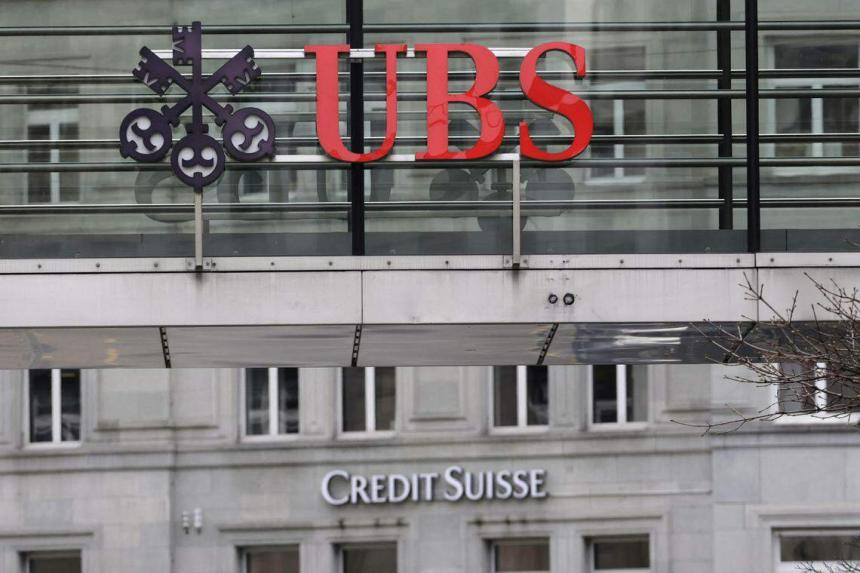SINGAPORE – The UBS takeover of Credit Suisse is not expected to have an impact on the stability of Singapore’s banking system, with the latter to continue operating in Singapore without interruption and its customers having access to their accounts, the Monetary Authority of Singapore (MAS) said on Monday.
The central bank added in its statement that Credit Suisse’s contracts with counterparties remain in force.
The two Swiss banks – key pillars of Swiss finance – do not serve retail customers, and they primarily run private banking and investment banking businesses in Singapore.
Besides banking activities, Credit Suisse also conducts financial services under other licensed entities in Singapore, MAS said, adding that for now, these entities will continue operating under their respective licences.
MAS said that it has been in close contact with the Swiss Financial Market Supervisory Authority (Finma), and was briefed by the regulator earlier on Monday on the details of the takeover.
As the takeover is executed, MAS, Finma, Credit Suisse and UBS will “facilitate an orderly transition, including addressing any impact on employment”.
The Straits Times understands from market sources that Credit Suisse employs roughly 3,500 people in Singapore. A report in July 2018 by The Business Times put the number at 4,000.
In a reply to ST’s queries, Credit Suisse said it does not expect any disruption to client services.
“We are fully focused on ensuring a smooth transition and seamless experience for our valued clients and customers. Our Asia Investment Conference in Hong Kong (planned for March 21 to 23) goes ahead as planned, and our focus remains on serving our clients,” the bank added.
MAS’ statement on Monday came a day after Finma announced that UBS has agreed to buy long-time rival Credit Suisse for 3 billion Swiss francs (S$4.3 billion). UBS will also assume up to US$5.4 billion (S$7.2 billion) in losses in a deal expected to close by the end of 2023.
As one of the 30 global banks deemed systemically important, the fall of Credit Suisse would have rippled through the global financial system.
In measures aimed at ensuring stability for the Swiss and international financial markets, Switzerland’s central bank said that Sunday’s deal includes 100 billion Swiss francs in liquidity assistance for UBS and Credit Suisse.
Under the unprecedented deal orchestrated at the weekend by the Swiss authorities to prevent a financial meltdown, holders of Credit Suisse’s additional tier one (AT1) bonds will suffer a historic loss as their investments will be wiped out.
Finma has ordered that 16 billion Swiss francs of the bank’s AT1 bonds be written down to zero, while the bank’s shares will still retain some value.
Sovereign wealth fund GIC, when asked about its exposure to Credit Suisse bonds and if it still has a stake in UBS, declined to comment on individual investments.
When contacted, Temasek said it does not have any direct exposure to Credit Suisse shares, bonds or debt.
The three local banks – DBS Bank, OCBC Bank and UOB – told ST last week that their exposure to Credit Suisse was insignificant.
On Monday, UOB said it has no exposure to Credit Suisse bonds.
AT1 bonds, also known as contingent convertible bonds, are a relatively risky class of bank debt.
Data compiled by Bloomberg showed that Credit Suisse’s holding company had 13 AT1 bonds outstanding, issued in Swiss francs, United States dollars and Singapore dollars.
In a note sent out on Monday, research firm CreditSights said the takeover by UBS should be sufficient to reverse the crisis in confidence that has engulfed Credit Suisse.
“It appears that no losses will be imposed on Credit Suisse’s senior bonds, so prices should recover significantly as they will become obligations of UBS, one of Europe’s strongest banks,” it said. Senior bonds are bonds that take precedence over other debts in the event of bankruptcy or liquidation.
But CreditSights said that there is a danger that Finma’s actions will hit the wider European bank AT1 market badly as investors reinterpret the risk of a write-down and the ranking of AT1 bonds versus equity.
A former senior executive of both UBS and Credit Suisse expressed sadness over the events, saying that although the narrative is that it is business as usual, the reality is that it is difficult to do so after something so momentous. “It takes time for people to settle down, and people need to plan.”
Fielding calls on Monday from former colleagues looking for jobs, he said the writing is on the wall for layoffs as UBS has publicly said it does not intend to have Credit Suisse’s investment banking division.
Still, he said that “there could be different treatments across regions”.
Associate professor of economics Jamus Lim of Essec Business School Asia-Pacific thinks “the local front-office market should be sufficiently deep to absorb most displaced workers within a few months”, but he said it would depend on whether account outflows from Credit Suisse get redirected to other local financial intermediaries.
Global banking stocks tumbled on Monday despite initial relief over the deal to rescue Credit Suisse, with the shares of all three Singapore banks ending the day down by at least one per cent.
- Additional reporting by Prisca Ang


